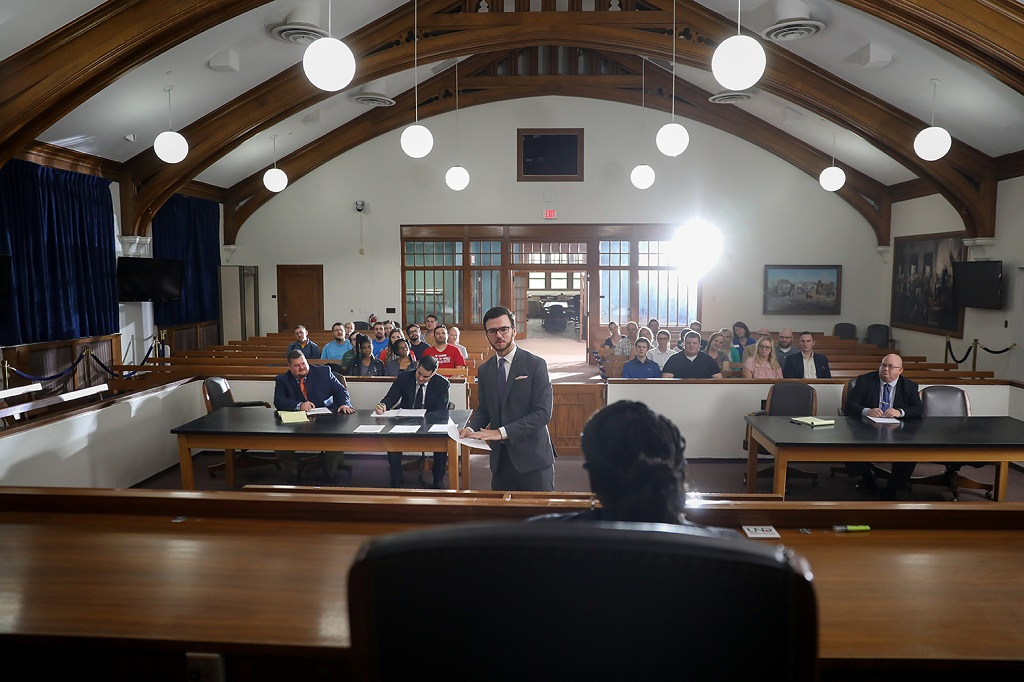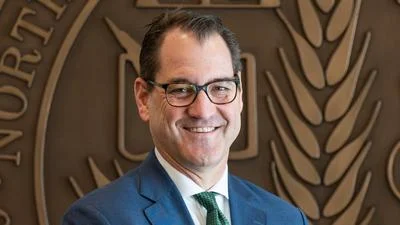Free to use Anonymous lady using laptop for studies in sunny park | Karolina Grabowska
Free to use Anonymous lady using laptop for studies in sunny park | Karolina Grabowska
New master’s degree program will start this fall, be available both on campus and online
 As part of their graduate training in Criminal Justice, students will study in depth the flow of cases from the police through courts and to corrections. Photo by Shawna Schill/UND Today.
As part of their graduate training in Criminal Justice, students will study in depth the flow of cases from the police through courts and to corrections. Photo by Shawna Schill/UND Today.
UND’s Department of Criminal Justice will be launching a Master of Science degree in Criminal Justice Studies for the Fall 2023 semester.
Like the existing bachelor’s degree program, the M.S. in Criminal Justice Studies will be available both online and on-campus.
Bradley Rundquist, dean of the College of Arts & Sciences, said the program should be especially attractive to working professionals seeking to enhance their skills and credentials in today’s criminal justice field, in addition to providing a step up for students completing their undergraduate degrees at UND.
“This new master’s degree addresses workforce needs in North Dakota and across the region,” Rundquist said. “It also offers unique electives focusing on rural criminology and tribal justice, which are understudied aspects of our criminal justice system.”
Chris Nelson, dean of the School of Graduate Studies, agreed. “We are thrilled to add an online-available master’s degree to our portfolio as well,” Nelson said. “This will help us better serve our local, state and regional law enforcement professionals looking to advance their careers.”
Serving as Graduate Director for the new degree program will be Adam Matz, associate professor of criminal justice, who said UND is positioned to fill gaps in a field that tends to focus on urban law enforcement.
The department has also recently brought in several new faculty from a diverse set of criminal justice backgrounds, which further energized the formation of a master’s degree program, he said.
“We have an opportunity with this program to stand out and go beyond the macro-level view of criminal justice systems and related research that students learn in the bachelor’s program,” Matz said. “We’re able to examine topics more relevant to the region, and, in turn, teach how to translate research into practice.”
Matz thinks the new program will help bolster research opportunities and involve students in research who are looking for careers in corrections, treatment, support services and policing, as well as in the nonprofit sector.
Graduate-level work in data analytics, especially, will be of great value to most areas of the field, Matz said, as agencies and interest groups increasingly rely on data to make decisions on programs and policies.
Overall, this new degree can help students work in what is called “translational criminology” – bringing both academic research and current practices to bear in making evidence-based decisions.
And for students already in a professional setting, the M.S. in Criminal Justice Studies will provide a non-thesis option for graduation, meaning that students can contribute to their agency or organization through their degree work, if desired.
Matz remarked that the non-thesis option was one of the first things the department had in mind when planning out the degree.
“All the way around, from teaching to scholarly work and so forth, we’re really excited for this program,” he said.
More from AuthorConnor Murphy is a 2015 graduate of the University of North Dakota, where he earned a degree in Communication. He joined UND Today in 2017 as a writer and now serves as internal communications editor in the Division of Marketing & Communications.
Original source can be found here.




 Alerts Sign-up
Alerts Sign-up